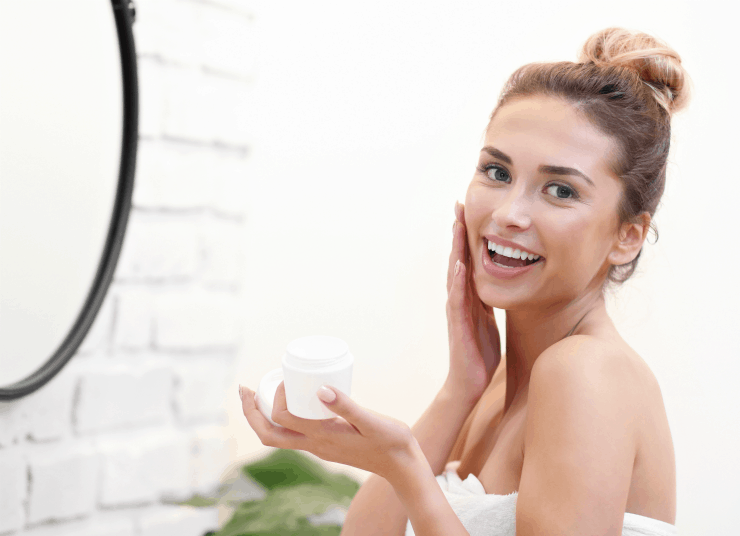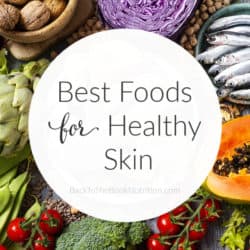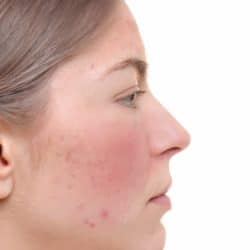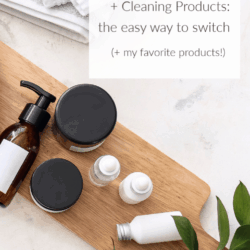Ever wonder what’s really causing your skin problems? Chronic skin issues dry skin, acne, eczema, rosacea, and skin aging are often a result of deeper root issues that can’t be fully resolved with topical creams and lotions. These 11 natural tips for healthy skin will help you find the root causes of your skin symptoms and get healthier, younger looking skin from the inside out!

Note from Dena: This guest post was co-written with Rachel Orton, Dietetic Intern, as part of a research partnership between Back To The Book Nutrition and post-graduate nutrition students from Texas Woman’s University.
Whether it’s wrinkles, acne, eczema, or just trying to get that natural glow, we’re all searching for ways to keep our skin youthful and healthy. But how do you know what actually works, and when you need to look beneath the lotions and potions for deeper root causes of skin issues?
This article will help you do just that. We’ve compiled the best natural tips for healthy skin, including ways to address some of the most common root causes of skin problems.
Natural Tips for Healthy Skin
1. Eat Real Food
It’s impossible to have glowing, healthy skin without good nutrition and nutrient deficiencies often contribute to a number of skin problems. Eating a diet rich in healthy, whole foods and with minimal processed foods and plenty of fluids help to hydrate the skin is the place to start.
Here are a few specific nutrients and foods that promote healthy skin:
- Omega 3’s – wild caught fatty fish and seafood, flax, chia, walnuts
- Beta Carotene – butternut squash, other orange fruits and vegetables, watermelon
- Vitamin A – liver, meats and dairy from animals raised on pasture, pastured eggs, cod liver oil
- Vitamin C – bell peppers, citrus, broccoli, berries
- Vitamin E – olive oil, nuts and seeds, tomato sauce
- Zinc – wild caught shellfish, liver, red meat, pumpkin seeds
- Collagen – collagen peptides, bone broth
Get our complete list of nutrients and foods for healthy skin here!
2. Focus on the source of the problem instead of trying to mask the symptoms
Since skin is on the surface of our bodies, many people assume that all skin problems are a result of external factors, and that just applying topical creams and lotions externally is the best way to improve their skin. But that’s just not the case.
Skin is the largest organ of the human body with its own ecosystem of of microbes (“skin microbiome”) that are in constant interaction with our gut, our immune function, our hormones, and more. So it’s more accurate to view chronic skin issues as a an “alarm” going off to tell us that our gut, our immune function, or our hormones, or some other major body system isn’t functioning optimally.
It’s fine to apply products topically to protect and soothe the skin. But treating symptoms with topical treatments alone isn’t going to fix the source of our skin problems; it requires a more holistic approach. Keep reading for specific steps to help you identify and address common root causes of skin issues.
3. Reduce Stress
How Stress Damages Skin:
- Stress creates inflammation, which can lead to flare-ups of eczema and psoriasis.
- Chronic stress stimulates oil-producing sebaceous glands of the skin, which can increase acne.
- Stress can also damage our DNA, resulting in fine lines and wrinkles, uneven pigmentation, loss of elasticity, and dullness. (1)
- Stressful seasons can also lead to poor gut health and hormone imbalance, both of which can result in skin rashes, eczema, acne, rosacea, and more.
How to Reduce Stress:
- Say “no” to unnecessary commitments.
- Practice deep breathing – try the 4-7-8 breathing technique to lower stress.
- Schedule time for daily prayer, journaling, meditation, etc.
- Set healthy boundaries in work and relationships.
- Make time for hobbies and leisure.
- Balance your blood sugar.
- Address underlying illnesses, gut imbalances, etc. that put stress on the body.
4. Get More Sleep
How Lack of Sleep Damages Skin:
- Sleep deprivation or poor sleep quality is a form of stress and interferes with normal cortisol cycling.
- Lack of sleep can damage DNA, promoting skin aging and wrinkles.
- Poor sleep decreases the skin’s ability to repair damage from the sun and other external factors. (2)
How to get more sleep and sleep better:
- Limit electronics and screen time for at least an hour before bed.
- Be asleep by 10 pm each night for optimal melatonin product, which helps regulate cortisol rhythms.
- Sleep in a completely dark environment.
- Get natural daylight exposure early and often throughout the day.
- Learn more practical tips for better sleep here.
5. Fix Your Gut
How Poor Gut Health Damages Skin:
- Gut infections, fungal or bacterial dysbiosis, and inflammation can cause leaky gut, which has been linked to rashes, eczema, and psoriasis.
- Irritable Bowel Syndrome (IBS) and Small Intestinal Bacterial Overgrowth (SIBO) are strongly linked to rosacea.
How to Improve Gut Health:
- Reduce use of NSAIDs, antibiotics, oral contraceptives, corticosteroids, and other medications that disrupt the gut microbiome.
- Cut back on sugar and refined grains which lead to dysbiosis and overgrowths.
- Eat more prebiotic fiber, which help maintain healthy balance of good and bad bacteria in the gut.
- Include fermented foods and/or take high quality probiotic supplements daily to improve overall gut health and reduce acne and inflammation. (3,4)
- Get a comprehensive stool test to identify gut health issues that can be addressed with the help of a holistic practitioner.
Schedule a free call to learn more about stool testing!
6. Address Food Sensitivities
How Food and Environmental Sensitivities Damage Skin:
- Even if you don’t have true allergies, sensitivities to foods, food additives, or chemicals in the environment can cause delayed and often less severe immune reactions that lead to skin bumps, rashes, or itching.
How to Identify and Overcome Food Sensitivities:
- Keep a symptom journal to try to identify which foods or environmental chemicals might be linked to your symptoms.
- Try an elimination and reintroduction diet for 30-60 days.
- Ideally, get a comprehensive stool test since sensitivities are notoriously linked to poor gut health and leaky gut. In these cases, sensitivities often resolve when the underlying gut issues are addressed.
- Food sensitivity testing can be helpful in some extreme cases, but can be quite expensive so I (Dena) generally reserve this for after the above steps have been taken.
Schedule a free call to learn whether stool testing or food sensitivity testing are right for you!
7. Check Your Thyroid
How Hypothyroidism (Low Thyroid Function) Damages Skin, Hair, + Nails (5):
- Underactive thyroid can lead to dry skin, pale skin, and/or decreased sweating.
- Low thyroid can also cause brittle nails.
- Hypothyroidism can result in hair loss from the scalp and/or from the outer third of the eyebrows.
- A drooping upper eyelid can develop in individuals with an underactive thyroid.
- Hashimoto’s Thyroiditis (autoimmune hypothyroidism) has been linked to hives
How Hyperthyroidism (High Thyroid Function) Damages Skin, Hair, + Nails (5):
- Hyperthyroid (high thyroid function) can lead to smooth, thin skin and increased sweating.
- Overactive thyroid can also lead to hair loss.
- “Plummer’s Nails” (onycholysis) – where the tip of the fingernail separates from the finger, most commonly the ring finger – can happen in hyperthyroidism.
How to Improve Thyroid Function:
- Eat a diet rich in whole foods with minimal processed foods and consider omitting gluten since it has been linked to thyroid autoimmunity.
- Reduce and manage stress since your HPA-axis that helps respond to stress is also responsible for making TSH that tells the thyroid how much thyroid hormone to make.
- Request a FULL thyroid panel from your doctor or holistic healthcare provider like Dena. Unfortunately, it’s extremely rare for doctors to order this so you’ll need to be clear about wanting the full panel, not just one or two of these. A full thyroid panel should include at least the following tests:
- TSH
- Free T4
- Free T3
- Reverse T3
- TPO – antibodies for Hashimoto’s Thyroiditis (autoimmune hyperthyroidism)
- ATA – – antibodies for Hashimoto’s Thyroiditis (autoimmune hyperthyroidism)
- TSI – antibodies for Graves Disease (autoimmune hyperthyroidism)
Schedule a free call to learn how to order a full thyroid panel!
8. Balance Your Hormones
How Hormone Imbalance Damages Skin:
- Excess estrogen or androgens (testosterone, etc.) can cause acne.
- Low estrogen can result in dry skin and skin thinning or sagging.
- Starting hormonal birth control, or going off of it (i.e., Post Birth Control Syndrome) can cause acne.
- Hormone related hair loss can also happen during or after hormonal birth control.
How to Balance Your Hormones:
- Eat real food and minimize sugar, caffeine, and alcohol.
- Improve sleep and stress management.
- Follow these other tips to balance your hormones naturally.
- Consider comprehensive stool test to identify underlying gut issues causing hormone imbalance.
- Consider comprehensive hormone testing to help identify specific hormone imbalances.
Schedule a free call to learn more about comprehensive hormone testing!
9. Support Detox
How Poor Detoxification Damages Skin (7):
- Compromised detoxification pathways in the liver, gut, and lymph can manifest in skin lesions, rashes, discoloration, or acne.
- Exposure to heavy metals, carcinogens, and other toxic compounds can cause skin redness, irritation, inflammation, and rashes if the body cannot detoxify them adequately.
How to Support Healthy Detox:
- The best way to support detox is to eat a real food diet rich in a variety of brightly colored plant foods, cruciferous vegetables, beans/legumes, fresh herbs, high quality meats and seafood, all of which provide nutrients that aid the body’s natural detoxification processes in the liver, kidneys, and gut. (6)
- Hydrate well.
- Sweating has been shown to increase excretion of arsenic, cadmium, lead, and mercury after exposure. Sweating through exercise or sitting in a sauna are both helpful. Always shower afterward to help remove residue from the skin. (8)
- Dietary supplements that support liver function, methylation, gut health, and other detox pathways may be beneficial.
- Dry brushing uses a firm, bristled brush to remove dead skin cells. It may help stimulate lymphatic flow to aid detoxification, but very little study has been done to confirm this. Don’t dry brush skin that has lesions or is otherwise irritated or inflamed. (7)
- Epsom salt soaking baths are largely unsubstantiated but are a “might help, won’t hurt” effort to draw toxins out of the skin layer.
10. Switch to Nontoxic Makeup and Personal Care Products
How Traditional Makeup and Personal Care Products Damage Skin:
- Traditional make up and skin care products are often full of pthalates, parabins, fragrances, and other chemical toxins that lead to skin irritation, whether directly or indirectly via hormone imbalance, poor gut health, immune dysfunction, and more.
How to Switch to Nontoxic Makeup and Personal Care Products:
11. Limit Exposure to Environmental Toxins
How Environmental Toxins Damage Skin (9):
- Volatile organic compounds (VOC’s) like those released from car emissions, paint, fumes from industrial facilities, etc. have been linked to eczema, dermatitis, and precancerous skin lesions.
- Polycyclic aromatic hydrocarbons from automobile exhaust, plastics, pesticides, dyes, and fumes from burning organic materials are associated with skin aging and cancers.
- Cigarette smoke has been linked to skin aging, psoriasis, acne, eczema, and skin cancer.
- Ultraviolet radiation (UV rays) from excess sun exposure and tanning beds can lead to skin aging, wrinkles, and some types of skin cancer.
How to Protect the Skin from Environmental Toxins (9):
- Avoid processed foods with chemical additives
- Eat organic as much as possible
- Quit smoking! It will do wonders for slowing aging and wrinkle development
- Limit excess sun exposure and avoid tanning beds to prevent UV damage.
- Avoid air pollution and consider using an air purifier with a HEPA filter in your home and office.
Check out these other great posts on skin health!
Best Foods for Healthy Skin
10 Ways to Overcome Acne Naturally
What Really Causes Rosacea and How to Overcome it Naturally
Natural Skin Care & Cleaning – how to switch + my favorite products

About the Co-Author: Rachel Orton’s love for nutrition developed through her own life story. She is pursuing a career in dietetics in an attempt to help educate others on the healing powers of food through her attained knowledge and personal testimony. Rachel is currently a Dietetic Intern and master’s student at Texas Woman’s University. Her B.S. in Nutrition Wellness was completed at Auburn University, alongside studies in Hunger. She later attended the University of Georgia for completion of the Didactic Program in Dietetics.
Disclaimer: Information on this site is intended only for informational purposes and is not a substitute for medical advice. Always consult with a trusted healthcare provider before implementing significant dietary change. Read additional disclaimer info here.
References:
- Chen, Y., & Lyga, J. (2014). Brain-skin connection: stress, inflammation and skin aging. Inflammation & allergy drug targets, 13(3), 177-90. https://www.ncbi.nlm.nih.gov/pmc/articles/PMC4082169/
- University Hospitals Case Medical Center. “Sleep deprivation linked to aging skin, study suggests.” ScienceDaily. ScienceDaily, 23 July 2013. https://www.sciencedaily.com/releases/2013/07/130723155002.htm
- Cole, W. Your Complete Functional Medicine Guide to Clear and Glowing Skin. https://drwillcole.com/skin-health/your-complete-functional-medicine-guide-to-clear-glowing-skin
- Salem, I., et al. (2018). The Gut Microbiome as a Major Regulator of the Gut-Skin Axis. Front Microbiol, 9: 1459. https://www.ncbi.nlm.nih.gov/pmc/articles/PMC6048199/
- Safer, J. (2011). Thyroid hormone action on skin. DermatoEndocrinology, 3(2), 211-215. https://www.ncbi.nlm.nih.gov/pmc/articles/PMC3219173/
- Hodges, R.E. and Minich, D.M. (2015). Modulation of Metabolic Detoxification Pathways Using Foods and Food-Derived Components: A Scientific Review with Clinical Application. J Nutr Metab. https://www.ncbi.nlm.nih.gov/pmc/articles/PMC4488002/
- Vairo, G.L., et al. (2009). Systematic Review of Efficacy for Manual Lymphatic Drainage Techniques in Sports Medicine and Rehabilitation: An Evidence-Based Practice Approach. J Man Manip Ther., 17(3): e80-e89. https://www.ncbi.nlm.nih.gov/pmc/articles/PMC2755111/
- Sears, M.E., et al. (2012). Arsenic, Cadmium, Lead, and Mercury in Sweat: A Systematic Review. J Environ Public Health. https://www.ncbi.nlm.nih.gov/pmc/articles/PMC3312275/
- Puri, P., et al. (2017). Effects of air pollution on the skin: A review. Indian Journal of Dermatology., 83(4): 415-423. https://pubmed.ncbi.nlm.nih.gov/28195077/









Nice to find an article like this. I still have some hopes now for my Rosacea. Gonna do everything right!
Good for you, Aliceee – you may want to take a look at this article sharing the real root causes of Rosacea and how to overcome them naturally!
These are really GOOD tips. As a health and wellness professional, I can say that gut health and everyday diet play important roll in skin health. Great article.
Definitely! Thanks for your input, Natalie.
These are some great tips for healthy skin. Sometimes, I feel everything starts and ends with Gut health…it’s so important for healthy life.
These are great tips. I have been taking omega 3 supplements and I can see the difference in my skin!
Awesome – thanks for sharing your experience, Lily!
Thanks for sharing these tips! It’s a great tips, I really learned a lot!
Natural option is my first thing for skin problem, and I always avoid processed foods with chemical additives. This is one of cause for skin problem.
Hihi….the foodie in me says yes to the real food, now and forever, Amen!
Ever since going on Accutane when I was 19 years old and learning that it’s a huge dose of Vitamin A, I’ve tried to add more vitamin A into my diet. I’ve gone to a dermatologist for the past 14 or so years and we’ve determined that my acne is mostly hormone related. Of course, nutrition can play a part in our hormones so I try to focus on eating healthy food daily.
Hormones are so important for skin health, and definitely linked to nutrient levels as well. Great points, Leah!
I am always looking for natural solutions to every day problems! Especially when it comes to my skin.
I love these tips.I love the idea of keeping myself looking beautiful without having to use chemical-laden products.